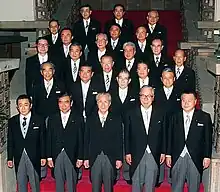Yōhei Kōno
Yōhei Kōno (河野 洋平, Kōno Yōhei, born 15 January 1937) is a Japanese politician and a former President of the Liberal Democratic Party. He served as Speaker of the House of Representatives from November 2003 until August 2009, when the LDP lost its majority in the 2009 election. Kōno served as speaker for the longest length since the set up of House of Representatives in 1890.[1]
Yōhei Kōno | |
|---|---|
河野 洋平 | |
 | |
| Speaker of the House of Representatives | |
| In office 19 November 2003 – 21 July 2009 | |
| Monarch | Akihito |
| Preceded by | Tamisuke Watanuki |
| Succeeded by | Takahiro Yokomichi |
| Minister of Foreign Affairs | |
| In office 5 October 1999 – 26 April 2001 | |
| Prime Minister | Keizo Obuchi Yoshiro Mori |
| Preceded by | Masahiko Kōmura |
| Succeeded by | Makiko Tanaka |
| In office 30 June 1994 – 11 January 1996 | |
| Prime Minister | Tomiichi Murayama |
| Preceded by | Koji Kakizawa |
| Succeeded by | Yukihiko Ikeda |
| Deputy Prime Minister of Japan | |
| In office 30 June 1994 – 2 October 1995 | |
| Prime Minister | Tomiichi Murayama |
| Preceded by | Vacant |
| Succeeded by | Ryutaro Hashimoto |
| President of the Liberal Democratic Party | |
| In office 9 August 1993 – 2 October 1995 | |
| Preceded by | Kiichi Miyazawa |
| Succeeded by | Ryutaro Hashimoto |
| Leader of the Opposition | |
| In office 9 August 1993 – 30 June 1994 | |
| Prime Minister | Morihiro Hosokawa Tsutomu Hata |
| Preceded by | Sadao Yamahana |
| Succeeded by | Toshiki Kaifu |
| Chief Cabinet Secretary | |
| In office 12 December 1992 – 9 August 1993 | |
| Prime Minister | Kiichi Miyazawa |
| Preceded by | Koichi Kato |
| Succeeded by | Masayoshi Takemura |
| Director General of the Science and Technology Agency | |
| In office 28 December 1985 – 22 July 1986 | |
| Prime Minister | Yasuhiro Nakasone |
| Preceded by | Reiichi Takeuchi |
| Succeeded by | Yataro Mitsubayashi |
| Personal details | |
| Born | 15 January 1937 Hiratsuka, Kanagawa, Japan |
| Political party | Liberal Democratic Party of Japan |
| Children | Tarō Kōno |
| Parent |
|
| Alma mater | Waseda University |
He was the president of the Japan Association of Athletics Federations from 1999 to 2013.[2]
Early life and education
Kōno was born on 15 January 1937, in Hiratsuka, Kanagawa, the eldest son of politician Ichirō Kōno. His father served as deputy prime minister and was in charge of the 1964 Tokyo Olympics. His younger uncle Kenzō Kōno served as the president of the House of Councillors from 1971 to 1977.
After graduating from Waseda University Senior High School, he studied Economics at Waseda University. Upon graduation, Kōno worked with the Marubeni company. In 1967, Kono's political career began due to the death of his father.
Political career

He was Deputy Prime Minister of Japan from 1994 to 1995 which he had strong influence in the Murayama Cabinet. He was Minister of Foreign Affairs under Prime Minister Tomiichi Murayama and Yoshirō Mori (1993-1995, 1999-2001). He is a member of the Liberal Democratic Party (LDP). He was once President of the LDP from 1993 to 1995, and to date is one of two LDP leaders, along with Sadakazu Tanigaki, to have never served as Prime Minister of Japan. As he is one of the pro-China faction of the LDP, he came under pressure domestically in the spring of 2005 when anti-Japanese movements in China became intense due to then Prime Minister Junichiro Koizumi visited the Yasukuni Shrine which he opposed the visit to.
Kōno is known for his acknowledgement of comfort women. During his tenure as Chief Cabinet Secretary, in a speech titled the official statement he made in 1993, made after historian Yoshiaki Yoshimi announced he had discovered in the Defense Agency library in Tokyo documentary evidence that the Imperial Japanese Army established and ran comfort stations, he admitted that the Japanese Imperial Army had been involved, directly and indirectly, in the establishment of comfort stations, and that coercion had been used in the recruitment and retention of the women. His subsequent call for historical research and education aimed at remembering the issue became the basis for addressing the subject of forced prostitution in school history textbooks.
Footnotes
- "Kono's tenure longest as speaker". The Japan Times. 20 November 2008. Retrieved 22 November 2008.
- The Successive President and Vice-President and Senior-Managing-Director of JAAF (日本陸連歴代会長・理事長・専務理事) (in Japanese) Japan Association of Athletics Federations. Retrieved 13 June 2012.